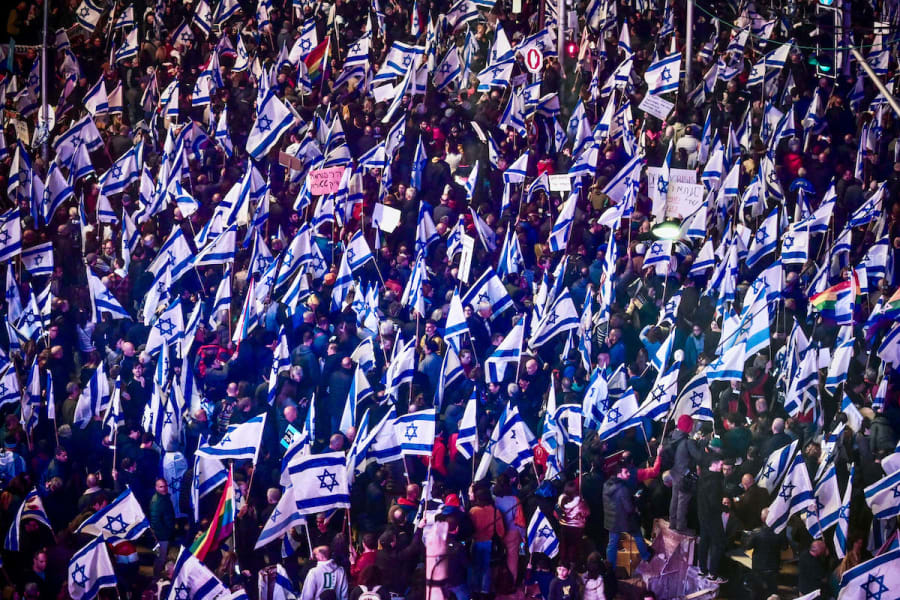Don’t tell Israelis why they’re protesting

It’s so easy to speculate why people do things, but the best way to find out is to ask them. Ever since Israelis began protesting the incoming Netanyahu government, there have been a variety of conclusions drawn by the many reporters who have attempted to dismiss the growing numbers of disenchanted citizens who have taken to the streets each weekend.
No different is the article entitled, “A Quiet Civil War” by Danielle Roth-Avneri, which recently appeared in the Jerusalem Post. “At the end of the day, there is one camp in Israel that is fighting because it was told there would be a dictatorship, while another camp feels that all these protests are merely Netanyahu-hatred and an attempt to overthrow the government,” Roth-Avneri states.
Although the writer seems confident in her statement, it is not fact-based, because it supposes that every protester has been interviewed in order to know what they are thinking and what has motivated them to join a massive movement of people who have better things to do with their time than spend their evenings on the streets.
As the former senior editor and parliamentary correspondent of Israel Hayom, a right-leaning newspaper, her Bibi [Prime Minister Benjamin Netanyahu] bias is quite evident from her erroneous description of the protesters, whom she puts into the “anyone but Bibi camp” or the very gullible who can be convinced, with little proof, that a dictatorship awaits them.
By framing them in that way, Roth-Avneri is gives her fellow Israeli citizens no credit for being well-informed or able to come to proper conclusions about the real meaning and consequences of the proposed reforms. She doesn’t stop to consider why so many have suddenly turned on the longest-serving Israeli prime minister for whom they probably voted.
It didn’t take long for Israelis to figure out the very ambitious agenda of Netanyahu’s coalition members once they came into power because they didn’t do a very good job of hiding their aspirations. Almost immediately, Avi Maoz, head of the far-right Noam party, attempted to introduce changes that would have dramatically altered the character of the country. In his quest to head a “Jewish national identity” department of the government, he aspired to control the Education Ministry, overseeing what would be taught in Israeli schools. He also sought to do away with the grandchild clause in the Law of Return, which allows for the grandchildren of a Jewish grandparent to be eligible for immigration. Furthermore, he opposed women serving in combat units.
So, it wasn’t difficult to see that Maoz very much wanted to influence many sectors of Israeli society with his particular brand of “Jewish identity.”
Then there was Minister of National Security Itamar Ben Gvir, also very vocal about his aspirations to control his own national guard, as a personal militia, which would have authority over the Israeli police force. What could go wrong there?
And let’s not forget Justice Minister Yariv Levin, who has endlessly pressed for a complete judicial overhaul, which would take power away from judges and allow for the Knesset to override judicial decisions, effectively turning three branches of government into two.
Although tasked with the job of finance minister, Bezalel Smotrich also didn’t hide his very strong feelings, as it related to annexing more land or wiping an Arab community off the map, issues which are not in his purview, but which he, nonetheless, espoused.
No one can claim that all of these things were not said or done in the light of day, because the one thing the coalition members cannot be accused of is being subtle. Consequently, it is disingenuous of Roth-Avneri to contend that Israelis are protesting because someone told them that a dictatorship was on the horizon. In fact, you would have to be either brain dead or completely politically uninformed to not understand where things were heading, should the coalition members' wish list come to fruition.
What happened was a normal knee-jerk reaction. From the moment that these plans and proposals were expressed, ordinary Israeli citizens, who value their freedom – their right to choose how they want to live and their widely held tolerance for those who are different – saw that all of these things were in jeopardy. That didn’t sit well with them, and the immediate reaction was to voice their disapproval of what was being pushed forward, without their input or any discussion.
The more coalition members insisted on having their way, the more the protesters took to the highway. And that has been the cycle, almost from the beginning of the new government. Protests were not fueled by a sudden unfounded hatred of Netanyahu but rather because Netanyahu, in building a one-voice coalition, has sought to have them change existing laws so he can retain power at a time when he is under indictment.
One such law bars “those sentenced to jail time in the preceding seven years from holding ministerial office.” Changing this law would have allowed Shas Party leader, Arye Deri, Netanyahu’s choice, to head both the Interior and Health Ministries, despite his having served jail time for taking bribes.
Israelis, who are big evening news watchers, were all too aware of these attempts to rewrite laws, intended to benefit the political parties in power. Once they began to see a trend, with all the agendas leading to one road, they came to their own conclusion that a dictatorship was not far away, because that is what happens when only one voice is allowed to be heard.
Known for their fair-mindedness, Israelis draw the line when it comes to using political power to shift the weight of balance to favor one group. It is this kind of injustice which flies against the diversity of thought and lifestyle which has become a hallmark for Israel being viewed as the only true democracy in the Middle East, a distinction which the country has held with pride.
Roth-Avneri laments the feeling that “Israeli society has sunk into a kind of quiet civil war.” She also notes that “everyone is under pressure to take sides, and people are very quickly catalogued.” Ironically, she fails to recognize that she is guilty of that same cataloguing by placing protesters into one of two boxes, those who either hate Bibi or those who fear rumors of a dictatorship.
She ends her article by explaining that there are divisions, within the coalition, which may contribute to the government’s decision to abandon further plans for reforms, but that such a move would greatly anger Levin, whom she claims initiated these changes from the start. In effect, she seems to be saying that certain political players may not be too eager to give up on their goals.
She might be right about that, but wrong about what is behind the protest movement and the reasons for its continuation. Roth-Avneri may do well to give a bit of credit to the Israeli public for being savvy enough to see the handwriting on the wall, especially when it’s written in bold capital letters!

A former Jerusalem elementary and middle-school principal who made Aliyah in 1993 and became a member of Kibbutz Reim but now lives in the center of the country with her husband. She is the author of Mistake-Proof Parenting, based on the principles from the book of Proverbs - available on Amazon.













